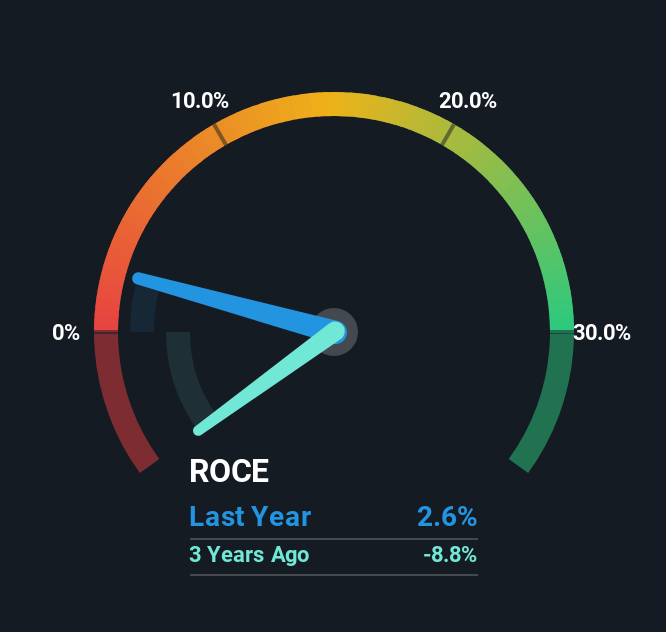Did you know there are some financial metrics that can provide clues of a potential multi-bagger? In a perfect world, we'd like to see a company investing more capital into its business and ideally the returns earned from that capital are also increasing. This shows us that it's a compounding machine, able to continually reinvest its earnings back into the business and generate higher returns. So on that note, Neptune (KOSDAQ:217270) looks quite promising in regards to its trends of return on capital.
What Is Return On Capital Employed (ROCE)?
For those who don't know, ROCE is a measure of a company's yearly pre-tax profit (its return), relative to the capital employed in the business. The formula for this calculation on Neptune is:
Return on Capital Employed = Earnings Before Interest and Tax (EBIT) ÷ (Total Assets - Current Liabilities)
0.026 = ₩10b ÷ (₩428b - ₩25b) (Based on the trailing twelve months to March 2025).
So, Neptune has an ROCE of 2.6%. Ultimately, that's a low return and it under-performs the Entertainment industry average of 5.7%.
Check out our latest analysis for Neptune

Historical performance is a great place to start when researching a stock so above you can see the gauge for Neptune's ROCE against it's prior returns. If you'd like to look at how Neptune has performed in the past in other metrics, you can view this free graph of Neptune's past earnings, revenue and cash flow.
What Does the ROCE Trend For Neptune Tell Us?
The fact that Neptune is now generating some pre-tax profits from its prior investments is very encouraging. About five years ago the company was generating losses but things have turned around because it's now earning 2.6% on its capital. Not only that, but the company is utilizing 434% more capital than before, but that's to be expected from a company trying to break into profitability. This can indicate that there's plenty of opportunities to invest capital internally and at ever higher rates, both common traits of a multi-bagger.
On a related note, the company's ratio of current liabilities to total assets has decreased to 5.9%, which basically reduces it's funding from the likes of short-term creditors or suppliers. This tells us that Neptune has grown its returns without a reliance on increasing their current liabilities, which we're very happy with.

The Key Takeaway
Long story short, we're delighted to see that Neptune's reinvestment activities have paid off and the company is now profitable. Considering the stock has delivered 29% to its stockholders over the last five years, it may be fair to think that investors aren't fully aware of the promising trends yet. So with that in mind, we think the stock deserves further research.
On a final note, we found 2 warning signs for Neptune (1 is concerning) you should be aware of.
For those who like to invest in solid companies, check out this free list of companies with solid balance sheets and high returns on equity.
Valuation is complex, but we're here to simplify it.
Discover if Neptune might be undervalued or overvalued with our detailed analysis, featuring fair value estimates, potential risks, dividends, insider trades, and its financial condition.
Access Free AnalysisHave feedback on this article? Concerned about the content? Get in touch with us directly. Alternatively, email editorial-team (at) simplywallst.com.
This article by Simply Wall St is general in nature. We provide commentary based on historical data and analyst forecasts only using an unbiased methodology and our articles are not intended to be financial advice. It does not constitute a recommendation to buy or sell any stock, and does not take account of your objectives, or your financial situation. We aim to bring you long-term focused analysis driven by fundamental data. Note that our analysis may not factor in the latest price-sensitive company announcements or qualitative material. Simply Wall St has no position in any stocks mentioned.
About KOSDAQ:A217270
Flawless balance sheet and fair value.
Market Insights
Community Narratives




